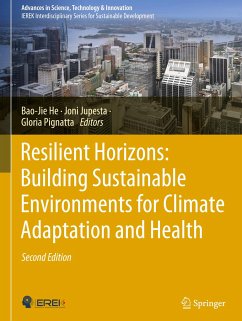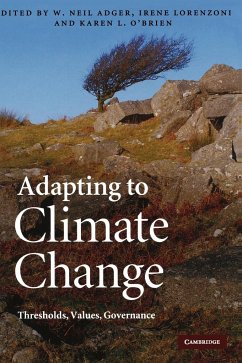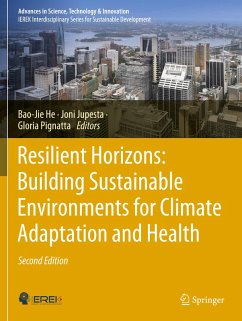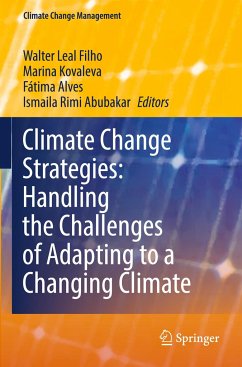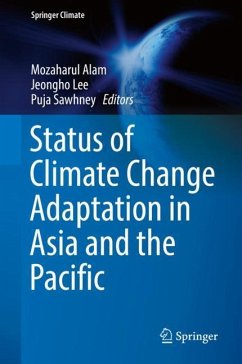
Resilient Shores: Adapting to Climate Change Through Storytelling
Versandkostenfrei!
Erscheint vorauss. 14. Januar 2026
53,99 €
inkl. MwSt.

PAYBACK Punkte
27 °P sammeln!
This book uses a fictional but realistic story of a coastal community relocating in the face of climate risk to illustrate how to make climate conversations happen, what those conversations can look like, and how to move from discussion to action. The book targets those who may feel that climate risks are nearly impossible to discuss, let alone achieve.By addressing risks as stories, communities can be better prepared to discuss and face climate change directly and comprehensively. Whether the attendee s community consists of family, friends, or work colleagues, are anchored to a specific phys...
This book uses a fictional but realistic story of a coastal community relocating in the face of climate risk to illustrate how to make climate conversations happen, what those conversations can look like, and how to move from discussion to action. The book targets those who may feel that climate risks are nearly impossible to discuss, let alone achieve.
By addressing risks as stories, communities can be better prepared to discuss and face climate change directly and comprehensively. Whether the attendee s community consists of family, friends, or work colleagues, are anchored to a specific physical place, we will have little choice but to adapt reducing risks, increasing your ability to bounce back, or reorganizing to a new normal.
The book demonstrates, not merely tells, why building personal stores can resolve problems, become dreams, and transition into achievable plans. After all, plans are merely repurposed stories with aspirational themes, where the revealis included within the first few paragraphs. We feel that storytelling offers a way to address a future that may be impossible for many to address in, any other way. Expected changes to our future weather demands we think of recreating our future differently. Storytelling can provide an emotionally safe way to proceed individually and communally.
Resilient Shores can be thought of as three books. It is a success story of how a community moves to safe ground. It is an instructional guide for inspired readers to help them create, or recreate their own, aspirational stories highlighting more realistic futures. It also shows how a public process can be fashioned to build trust and raise issues supporting their quest for resilience.
Flooding is an emotional event - people lose homes, memories, and sometimes lives. The trauma caused by experiencing increasingly severe flooding is painful for survivors to recall, let alone resolve. Resilient Storytelling offers a valuable and hopeful tool in our flood risk management arsenal. Larry Larson, Director Emeritus and Senior Policy Advisor at the Association of State Floodplain Managers (ASFPM).
Resilient Shores, through storytelling, builds a bridge connecting two seemingly different worlds: the world of climate-change policy responses grounded in science and economics, and the world of real people and communities seeking to protect their families and communities. May we use this book s lessons well to effectively merge these two worlds. Thomas Ruppert, Assistant Provost for Coastal Resilience at William & Mary, and Director of the Virginia Coastal Resilience Collaborative.
It has long been clear that, while hazard professionals of various strains deal regularly with data and statistics to understand the challenges we face following natural disasters, the general public relates largely through narrative and storytelling. We all need to get better at it, and Bob Freitag is taking the initiative of showing us how to make our stories meaningful, flexible, and most importantly, participatory. Just what the disaster doctor ordered. James C. Schwab, FAICP, (Retired) Manager, Hazards Planning Center, American Planning Association, and retired Adjunct Assistant Professor, University of Iowa School of Planning and Public Affairs.
Can stories save us? This is the question that is threaded through this highly useful and ultimately hopeful book. With a firm commitment to showing rather than to simply telling, Resilient Shores offers numerous examples of how storytelling can become central to our survival. As people are increasingly confronted by the reality of a rapidly warming world increasingly marked by disaster, this book offers a guide for how we might find common ground and envision more just and sustainable futures, together. So can stories save us? They just might. Lori Peek, Ph.D., Professor, Department of Sociology and Director, Natur
By addressing risks as stories, communities can be better prepared to discuss and face climate change directly and comprehensively. Whether the attendee s community consists of family, friends, or work colleagues, are anchored to a specific physical place, we will have little choice but to adapt reducing risks, increasing your ability to bounce back, or reorganizing to a new normal.
The book demonstrates, not merely tells, why building personal stores can resolve problems, become dreams, and transition into achievable plans. After all, plans are merely repurposed stories with aspirational themes, where the revealis included within the first few paragraphs. We feel that storytelling offers a way to address a future that may be impossible for many to address in, any other way. Expected changes to our future weather demands we think of recreating our future differently. Storytelling can provide an emotionally safe way to proceed individually and communally.
Resilient Shores can be thought of as three books. It is a success story of how a community moves to safe ground. It is an instructional guide for inspired readers to help them create, or recreate their own, aspirational stories highlighting more realistic futures. It also shows how a public process can be fashioned to build trust and raise issues supporting their quest for resilience.
Flooding is an emotional event - people lose homes, memories, and sometimes lives. The trauma caused by experiencing increasingly severe flooding is painful for survivors to recall, let alone resolve. Resilient Storytelling offers a valuable and hopeful tool in our flood risk management arsenal. Larry Larson, Director Emeritus and Senior Policy Advisor at the Association of State Floodplain Managers (ASFPM).
Resilient Shores, through storytelling, builds a bridge connecting two seemingly different worlds: the world of climate-change policy responses grounded in science and economics, and the world of real people and communities seeking to protect their families and communities. May we use this book s lessons well to effectively merge these two worlds. Thomas Ruppert, Assistant Provost for Coastal Resilience at William & Mary, and Director of the Virginia Coastal Resilience Collaborative.
It has long been clear that, while hazard professionals of various strains deal regularly with data and statistics to understand the challenges we face following natural disasters, the general public relates largely through narrative and storytelling. We all need to get better at it, and Bob Freitag is taking the initiative of showing us how to make our stories meaningful, flexible, and most importantly, participatory. Just what the disaster doctor ordered. James C. Schwab, FAICP, (Retired) Manager, Hazards Planning Center, American Planning Association, and retired Adjunct Assistant Professor, University of Iowa School of Planning and Public Affairs.
Can stories save us? This is the question that is threaded through this highly useful and ultimately hopeful book. With a firm commitment to showing rather than to simply telling, Resilient Shores offers numerous examples of how storytelling can become central to our survival. As people are increasingly confronted by the reality of a rapidly warming world increasingly marked by disaster, this book offers a guide for how we might find common ground and envision more just and sustainable futures, together. So can stories save us? They just might. Lori Peek, Ph.D., Professor, Department of Sociology and Director, Natur





